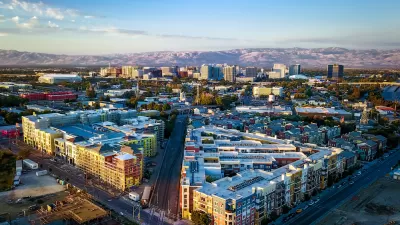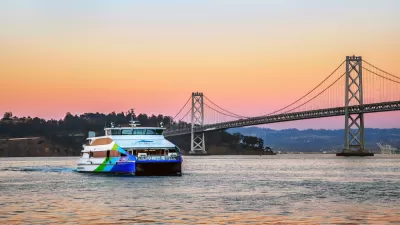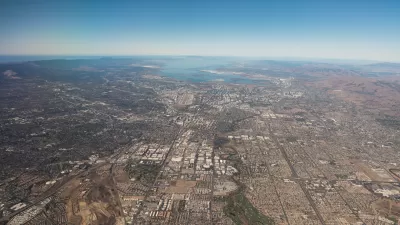You wouldn't be alone if you thought the tech industry had shifted its base of operations from the Silicon Valley to San Francisco. A new study of the tech industry's real estate footprint, however, reveals the South Bay's entrenched dominance.
Nathan Donato-Weinstein shares news of a new study by CBRE that "quantifies the Bay Area's tech footprint by industry subsector, revealing a number of interesting takeaways about site-selection trends, the state of the market and what risks might lie ahead for the regions' economies."
A key takeaway from the report: the commercial real estate market does not conform to the popular narrative about San Francisco emerging as a rival to the Silicon Valley's dominance as the geographic center of the tech industry. Donato-Weinstein explains:
While tech has certainly expanded in San Francisco ( hello, Salesforce Tower), the narrative may be overblown. In fact, the broader industry has continued to grow in its traditional South Bay stronghold. About 73 percent of all of the Bay Area's tech-occupied real estate is located in Silicon Valley, compared to 13 percent in San Francisco, 9 percent on the Peninsula and 5 percent in the East Bay.
Not only is the Silicon Valley home to the most tech companies, it leads the Bay Area in density of tech companies:
The report found that Silicon Valley remains the most dense tech market in the Bay Area, with 2,400 companies occupying 52 percent of the Valley's entire real estate footprint, or 126.4 million square feet of space. That compares to San Francisco's 1,800 tech companies occupying 22.4 million square feet of space, or 29 percent of all space. The Peninsula's 400 tech firms take up about 14.9 million square feet, also about 29 percent of the total office and R&D real estate. And Oakland's 700 tech firms occupy 8.6 million square feet, or 8 percent.
The article also considers some of the policies that are contributing to the Silicon Valley's dominance in the tech industry, relative to the rest of the Bay Area, along with more details from the study's findings.
FULL STORY: CBRE study quantifies tech's footprint around the Bay

Alabama: Trump Terminates Settlements for Black Communities Harmed By Raw Sewage
Trump deemed the landmark civil rights agreement “illegal DEI and environmental justice policy.”

Planetizen Federal Action Tracker
A weekly monitor of how Trump’s orders and actions are impacting planners and planning in America.

How Atlanta Built 7,000 Housing Units in 3 Years
The city’s comprehensive, neighborhood-focused housing strategy focuses on identifying properties and land that can be repurposed for housing and encouraging development in underserved neighborhoods.

In Both Crashes and Crime, Public Transportation is Far Safer than Driving
Contrary to popular assumptions, public transportation has far lower crash and crime rates than automobile travel. For safer communities, improve and encourage transit travel.

Report: Zoning Reforms Should Complement Nashville’s Ambitious Transit Plan
Without reform, restrictive zoning codes will limit the impact of the city’s planned transit expansion and could exclude some of the residents who depend on transit the most.

Judge Orders Release of Frozen IRA, IIJA Funding
The decision is a victory for environmental groups who charged that freezing funds for critical infrastructure and disaster response programs caused “real and irreparable harm” to communities.
Urban Design for Planners 1: Software Tools
This six-course series explores essential urban design concepts using open source software and equips planners with the tools they need to participate fully in the urban design process.
Planning for Universal Design
Learn the tools for implementing Universal Design in planning regulations.
Caltrans
Smith Gee Studio
Institute for Housing and Urban Development Studies (IHS)
City of Grandview
Harvard GSD Executive Education
Toledo-Lucas County Plan Commissions
Salt Lake City
NYU Wagner Graduate School of Public Service





























